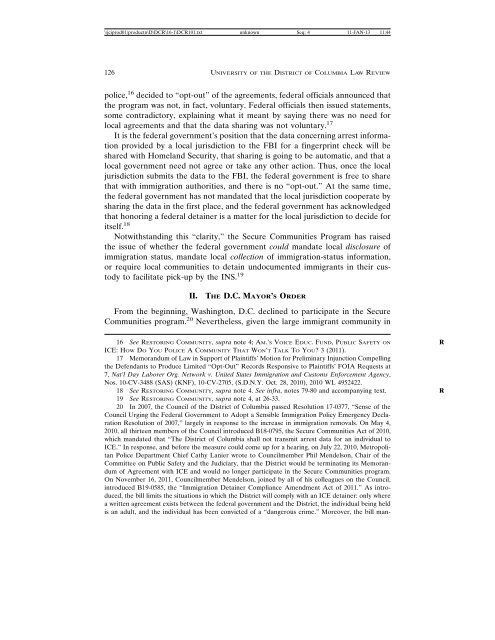threading the needle: constitutional ways for ... - UDC Law Review
threading the needle: constitutional ways for ... - UDC Law Review
threading the needle: constitutional ways for ... - UDC Law Review
You also want an ePaper? Increase the reach of your titles
YUMPU automatically turns print PDFs into web optimized ePapers that Google loves.
\\jciprod01\productn\D\DCR\16-1\DCR101.txt unknown Seq: 4 11-JAN-13 11:44<br />
126 UNIVERSITY OF THE DISTRICT OF COLUMBIA LAW REVIEW<br />
police, 16 decided to “opt-out” of <strong>the</strong> agreements, federal officials announced that<br />
<strong>the</strong> program was not, in fact, voluntary. Federal officials <strong>the</strong>n issued statements,<br />
some contradictory, explaining what it meant by saying <strong>the</strong>re was no need <strong>for</strong><br />
local agreements and that <strong>the</strong> data sharing was not voluntary. 17<br />
It is <strong>the</strong> federal government’s position that <strong>the</strong> data concerning arrest in<strong>for</strong>mation<br />
provided by a local jurisdiction to <strong>the</strong> FBI <strong>for</strong> a fingerprint check will be<br />
shared with Homeland Security, that sharing is going to be automatic, and that a<br />
local government need not agree or take any o<strong>the</strong>r action. Thus, once <strong>the</strong> local<br />
jurisdiction submits <strong>the</strong> data to <strong>the</strong> FBI, <strong>the</strong> federal government is free to share<br />
that with immigration authorities, and <strong>the</strong>re is no “opt-out.” At <strong>the</strong> same time,<br />
<strong>the</strong> federal government has not mandated that <strong>the</strong> local jurisdiction cooperate by<br />
sharing <strong>the</strong> data in <strong>the</strong> first place, and <strong>the</strong> federal government has acknowledged<br />
that honoring a federal detainer is a matter <strong>for</strong> <strong>the</strong> local jurisdiction to decide <strong>for</strong><br />
itself. 18<br />
Notwithstanding this “clarity,” <strong>the</strong> Secure Communities Program has raised<br />
<strong>the</strong> issue of whe<strong>the</strong>r <strong>the</strong> federal government could mandate local disclosure of<br />
immigration status, mandate local collection of immigration-status in<strong>for</strong>mation,<br />
or require local communities to detain undocumented immigrants in <strong>the</strong>ir custody<br />
to facilitate pick-up by <strong>the</strong> INS. 19<br />
II.<br />
THE D.C. MAYOR’S ORDER<br />
From <strong>the</strong> beginning, Washington, D.C. declined to participate in <strong>the</strong> Secure<br />
Communities program. 20 Never<strong>the</strong>less, given <strong>the</strong> large immigrant community in<br />
16 See RESTORING COMMUNITY, supra note 4; AM.’S VOICE EDUC. FUND, PUBLIC SAFETY ON R<br />
ICE: HOW DO YOU POLICE A COMMUNITY THAT WON’T TALK TO YOU? 3 (2011).<br />
17 Memorandum of <strong>Law</strong> in Support of Plaintiffs’ Motion <strong>for</strong> Preliminary Injunction Compelling<br />
<strong>the</strong> Defendants to Produce Limited “Opt-Out” Records Responsive to Plaintiffs’ FOIA Requests at<br />
7, Nat’l Day Laborer Org. Network v. United States Immigration and Customs En<strong>for</strong>cement Agency,<br />
Nos. 10-CV-3488 (SAS) (KNF), 10-CV-2705, (S.D.N.Y. Oct. 28, 2010), 2010 WL 4952422.<br />
18 See RESTORING COMMUNITY, supra note 4. See infra, notes 79-80 and accompanying text. R<br />
19 See RESTORING COMMUNITY, supra note 4, at 26-33.<br />
20 In 2007, <strong>the</strong> Council of <strong>the</strong> District of Columbia passed Resolution 17-0377, “Sense of <strong>the</strong><br />
Council Urging <strong>the</strong> Federal Government to Adopt a Sensible Immigration Policy Emergency Declaration<br />
Resolution of 2007,” largely in response to <strong>the</strong> increase in immigration removals. On May 4,<br />
2010, all thirteen members of <strong>the</strong> Council introduced B18-0795, <strong>the</strong> Secure Communities Act of 2010,<br />
which mandated that “The District of Columbia shall not transmit arrest data <strong>for</strong> an individual to<br />
ICE.” In response, and be<strong>for</strong>e <strong>the</strong> measure could come up <strong>for</strong> a hearing, on July 22, 2010, Metropolitan<br />
Police Department Chief Cathy Lanier wrote to Councilmember Phil Mendelson, Chair of <strong>the</strong><br />
Committee on Public Safety and <strong>the</strong> Judiciary, that <strong>the</strong> District would be terminating its Memorandum<br />
of Agreement with ICE and would no longer participate in <strong>the</strong> Secure Communities program.<br />
On November 16, 2011, Councilmember Mendelson, joined by all of his colleagues on <strong>the</strong> Council,<br />
introduced B19-0585, <strong>the</strong> “Immigration Detainer Compliance Amendment Act of 2011.” As introduced,<br />
<strong>the</strong> bill limits <strong>the</strong> situations in which <strong>the</strong> District will comply with an ICE detainer: only where<br />
a written agreement exists between <strong>the</strong> federal government and <strong>the</strong> District, <strong>the</strong> individual being held<br />
is an adult, and <strong>the</strong> individual has been convicted of a “dangerous crime.” Moreover, <strong>the</strong> bill man-














